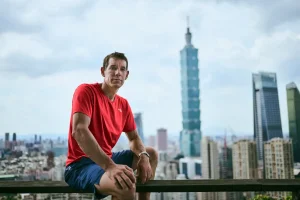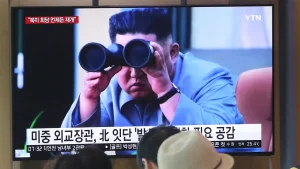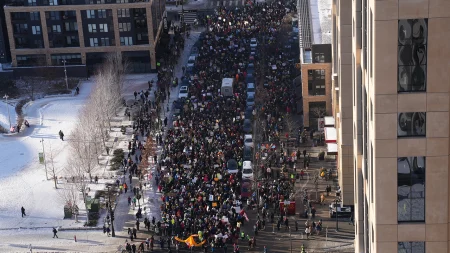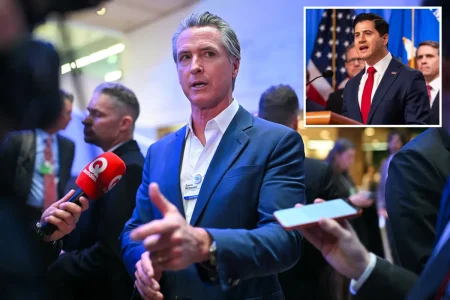María Corina Machado: The Determined Voice of Venezuela’s Democratic Opposition
A Formidable Force in the Shadows: How One Woman’s Political Movement Challenges Venezuela’s Authoritarian Regime
In the labyrinthine politics of Venezuela, where hope often gives way to despair, a singular voice has emerged as the embodiment of democratic resistance. María Corina Machado, once a congresswoman and now a formidable opposition leader, has accomplished what many thought impossible: building one of Venezuela’s most potent and cohesive political movements while evading the ever-present threat of President Nicolás Maduro’s authoritarian government. Her journey from parliamentarian to political fugitive illustrates the precarious state of democracy in a nation that once stood as South America’s wealthiest.
Machado’s political ascension is remarkable not merely for its trajectory but for its timing. Emerging during Venezuela’s most profound political and economic crisis, she has managed to unify disparate opposition factions that historically struggled with internal discord. “Democracy isn’t simply about elections; it’s about respecting the fundamental rights and dignities of all citizens,” Machado declared during her last public address before going underground. Her movement, Vente Venezuela, has transcended traditional political boundaries, attracting supporters from across Venezuela’s socioeconomic spectrum. What distinguishes her platform is its unapologetic stance against negotiating with the Maduro regime—a position that has earned her both devoted followers and dangerous enemies. Political analysts note that her unwavering commitment to democratic principles has resonated deeply with Venezuelans exhausted by economic hardship and political repression, creating a groundswell of support unprecedented in recent Venezuelan history.
The Strategic Evolution of Venezuela’s Opposition Under Siege
The landscape of Venezuelan opposition politics has been transformed under Machado’s influence. Where previous opposition efforts often faltered due to fractured leadership and strategic inconsistencies, her movement has established a sophisticated nationwide network operating despite intense surveillance and intimidation. This organizational structure represents a paradigm shift in Venezuelan resistance politics, employing decentralized leadership cells that can function autonomously even when communication channels are compromised. “What we’re witnessing is the evolution of opposition strategy in response to increasingly sophisticated authoritarian tactics,” explains Dr. Carmen Rodríguez, a political scientist specializing in Latin American governance at the University of Miami. “Machado has essentially created a resilient political ecosystem that can withstand the arrest or exile of any single leader—including herself.”
The movement’s strategic innovation extends beyond organizational structure to its messaging approach. Recognizing the government’s control over traditional media, Machado’s team has pioneered creative digital communication strategies that circumvent censorship while maintaining message discipline. Through encrypted applications, community radio networks, and grassroots organizing techniques, her coalition has established parallel information channels reaching even the most remote Venezuelan communities. These efforts have produced measurable results: recent clandestine polls suggest Machado would win a free and fair presidential election by substantial margins. “The regime’s greatest fear isn’t foreign intervention but domestic legitimacy—and Machado has become the legitimate voice of the Venezuelan people’s aspirations,” notes former Venezuelan diplomat Carlos Ramírez, who now researches democratic transitions at Georgetown University. This reality explains the intensifying government campaign against her and her supporters, which has included arbitrary detentions, asset freezes, and increasingly violent intimidation tactics.
Life in the Shadows: The Personal Cost of Political Resistance
The personal toll of Machado’s political stance has been severe and unrelenting. Once a public figure who freely traveled internationally advocating for democratic change, she now lives a clandestine existence, rarely spending consecutive nights in the same location. Her daily life consists of elaborate security protocols, coded communications, and the constant anxiety of potential capture. “The psychological warfare is deliberate,” explains a former security advisor to the opposition who requested anonymity. “The regime wants opposition leaders to feel perpetually exhausted and paranoid, making mistakes that could lead to their capture.” Despite these pressures, associates describe Machado’s unwavering focus and remarkable ability to maintain strategic clarity despite operating under extreme conditions.
Perhaps most poignant is Machado’s separation from her family. Her children now live abroad for safety reasons, and their communications are necessarily limited and secure. Associates report that this personal sacrifice weighs heavily on her, yet simultaneously strengthens her resolve. “When you’re fighting for your country’s future, you’re also fighting for your children’s right to return home,” she reportedly told a close confidante recently. This sentiment resonates with millions of Venezuelans in the diaspora who have fled economic collapse and political persecution. Human rights organizations have documented the Maduro government’s specific targeting of Machado’s extended family and close associates, a common tactic employed against dissidents. Despite these intensifying pressures, she has repeatedly rejected opportunities to accept exile, insisting her place remains in Venezuela alongside those who cannot escape the regime’s oppression. This decision has transformed her from a political figure into something more powerful: a symbol of principled resistance against overwhelming odds.
International Dimensions: Venezuela’s Crisis in Global Context
The international community’s response to Machado’s persecution illustrates the complex geopolitical considerations surrounding Venezuela’s crisis. While the United States, European Union, and many Latin American democracies have condemned the Maduro regime’s targeting of opposition figures, concrete actions to protect democratic activists within Venezuela remain limited. “The international response reflects competing priorities,” explains Dr. Elena Martínez, who specializes in Latin American international relations at Columbia University. “Democratic principles are important, but so are regional stability, migration concerns, and energy security—particularly given Venezuela’s vast oil reserves.” This reality has created a diplomatic environment where expressions of concern often outpace meaningful intervention.
Machado has consistently advocated for targeted international pressure focused on regime officials rather than broad sanctions that impact ordinary Venezuelans. This nuanced position has helped her maintain credibility with a population suffering under economic collapse while still pressing for meaningful external pressure on the Maduro government. Recent diplomatic developments suggest her approach may be gaining traction; several Latin American countries have begun exploring more creative diplomatic mechanisms to support democratic restoration. Meanwhile, Venezuelan diaspora communities in countries from Colombia to Spain have organized around Machado’s movement, providing financial support and international advocacy. This global network represents a significant resource for the opposition and a growing challenge for the Maduro regime’s international legitimacy. As one European diplomat noted in a background briefing: “What makes Machado particularly dangerous to the regime is her ability to articulate Venezuela’s democratic struggle in universal terms that resonate across ideological lines internationally.” This capacity to transcend Venezuela’s polarized politics explains both her growing international stature and the regime’s increasingly desperate efforts to silence her voice.
The Uncertain Path Forward: Democracy’s Prospects in Venezuela
The future of Venezuela’s democratic struggle remains uncertain, with multiple possible trajectories emerging from the current impasse. The Maduro regime’s economic mismanagement has created unsustainable conditions despite recent modest stabilization, while international isolation continues to limit reconstruction options. Within this context, Machado’s movement represents the most significant domestic challenge to authoritarian consolidation. “What we’re witnessing is a race between regime entrenchment and opposition resilience,” observes Venezuelan historian Rafael Uzcátegui. “The question isn’t whether change will come to Venezuela, but whether democratic forces can maintain sufficient cohesion and popular support to shape that inevitable transition.”
For Machado personally, the path forward involves immense risk. Historical precedents from Latin America’s authoritarian periods suggest opposition leaders in her position face three primary outcomes: capture and imprisonment, forced exile, or continued clandestine resistance. Her consistent rejection of negotiated solutions that preserve the current power structure has made her particularly vulnerable to regime retribution. Yet this uncompromising stance has also cemented her moral authority among Venezuelans. “When you stand for principles rather than power, you transform political contests into moral ones,” notes Father Antonio Pérez, a liberation theologian who has observed Venezuela’s democratic struggles for decades. “Machado has reframed Venezuela’s crisis from a political competition to a moral imperative for democratic restoration.” This transformation represents perhaps her most significant achievement—creating a moral clarity around Venezuela’s democratic struggle that transcends traditional political calculations. As Venezuela approaches a critical juncture, with economic pressures mounting and international patience with the Maduro regime waning, Machado’s movement stands ready to channel popular aspirations toward democratic renewal. Whether from the shadows or eventually in the light of democratic governance, María Corina Machado has permanently altered Venezuela’s political landscape through her courage, strategic vision, and unwavering commitment to democratic principles.










